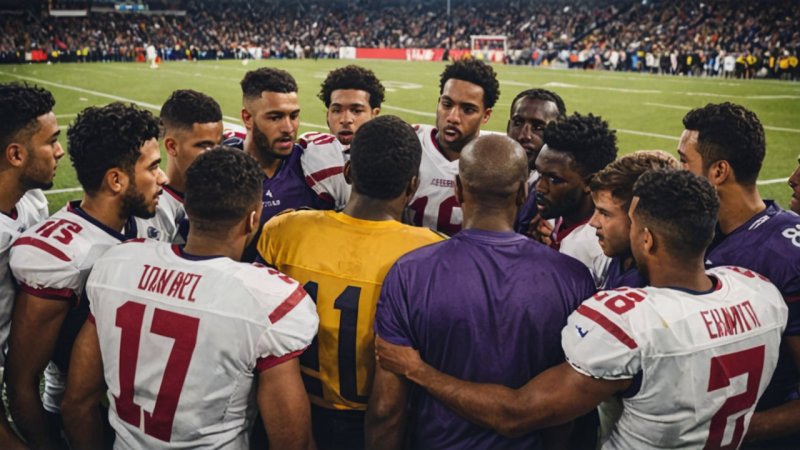In the high-octane world of football and rugby, where physicality often takes center stage, the importance of emotional intelligence—particularly empathy—should not be overlooked. While much focus is placed on training, tactics, and physical conditioning, fostering an empathetic culture within teams and coaching staff plays a crucial role in ensuring a safe and supportive environment for athletes. This article delves into the multifaceted role of empathy in sports, examining its impact on player safety, mental health, teamwork, and overall performance.
Understanding Empathy in Sports
Empathy, in its essence, is the ability to understand and share the feelings of others. In the context of sports, it can manifest in various ways, from coaches recognizing the stressors their athletes face, to players supporting each other during challenging times. Empathy not only aids in building strong interpersonal relationships but also contributes to a culture of safety and well-being.
The Importance of Empathy for Coaches
Coaches are pivotal figures in shaping the experiences of their athletes. By fostering an empathetic approach, they can:
- Recognize Individual Needs: Understanding that each athlete has unique emotional and physical needs allows coaches to tailor their approaches, ensuring that players feel valued.
- Promote Open Communication: An empathetic coach encourages athletes to express their feelings and concerns, leading to a more transparent relationship.
- Develop Trust: When players feel understood, they are more likely to trust their coaches, resulting in better adherence to training regimens and strategies.
Empathy Among Teammates
The bonds formed between teammates can significantly influence performance and safety. Empathic relationships foster an environment where players feel comfortable sharing their challenges, whether they are physical or emotional. This camaraderie can lead to:
- Improved Communication: Teammates who empathize with one another are more likely to communicate effectively, both on and off the field.
- Increased Cohesion: A team that understands and supports each other is more resilient, which can enhance overall performance.
- Enhanced Mental Health: A supportive atmosphere can help mitigate stress and anxiety, leading to healthier athletes both mentally and physically.
Empathy and Player Safety
One of the most critical aspects of sports, particularly in contact sports like football and rugby, is player safety. Empathy plays a vital role in ensuring that safety protocols are not only adhered to but also understood and respected among players.
Recognizing Signs of Distress
Empathetic teammates and coaches are better equipped to identify signs of emotional or physical distress. This can include:
- Changes in Behavior: A drop in performance, withdrawal from team activities, or unusual fatigue can signal that a player is struggling.
- Physical Symptoms: Injuries often come with emotional challenges. An empathetic environment encourages players to report injuries without fear of judgment.
- Mental Health Awareness: By promoting mental health as a priority, teams can create an atmosphere where seeking help is normalized.
Creating a Culture of Safety
Empathy can help establish a culture where safety is paramount. This includes:
- Encouraging Reporting: Players should feel comfortable reporting safety violations or personal concerns without fear of repercussions.
- Implementing Safety Protocols: Coaches should actively involve players in discussions about safety measures, ensuring they understand their importance.
- Providing Resources: Access to mental health professionals and support systems should be made available to all athletes.
The Link Between Empathy and Performance
While safety is a primary concern, the ripple effects of empathy extend into performance as well. Research shows that teams with a strong foundation of empathy tend to perform better on the field.
Building Resilience
Empathy fosters resilience among athletes, enabling them to bounce back from setbacks. This is achieved through:
- Supportive Feedback: Constructive criticism delivered with empathy encourages improvement without diminishing self-worth.
- Encouraging Risk-Taking: When players feel supported, they are more likely to take calculated risks that can lead to innovative strategies and plays.
- Collective Goals: Empathetic teams work together towards common goals, enhancing motivation and commitment.
Enhancing Motivation
Players who feel understood and valued are often more motivated to train harder and perform better. Factors contributing to this include:
- Intrinsic Motivation: Empathy helps players connect their personal goals with team objectives, fostering a sense of purpose.
- Accountability: A strong team bond encourages players to hold each other accountable, promoting a culture of excellence.
- Positive Reinforcement: Celebrating achievements—big or small—within an empathetic framework enhances overall morale.
Challenges in Fostering Empathy
Despite its benefits, fostering empathy within a sports environment is not without challenges. Some of these include:
Competitive Pressures
In high-stakes environments, the focus on winning can overshadow the importance of emotional well-being. Coaches and players alike may prioritize competition over empathy, leading to:
- Fear of Vulnerability: Athletes may hesitate to express emotions for fear of being perceived as weak.
- Neglect of Mental Health: The stigma surrounding mental health in sports can result in athletes suffering in silence.
Cultural Differences
Sports often attract individuals from diverse backgrounds, each with different values and beliefs regarding emotional expression. This can create barriers to empathy, such as:
- Communication Styles: Variations in communication can lead to misunderstandings and hinder empathetic exchanges.
- Individualism vs. Collectivism: Players from individualistic cultures may struggle with the team-oriented nature of empathy.
Strategies for Promoting Empathy in Sports
To create a safer, more empathetic sports environment, teams can implement the following strategies:
Training and Education
Incorporating empathy training into coaching education can equip coaches and athletes with the skills needed to foster an empathetic culture. This might include:
- Workshops: Regular workshops on emotional intelligence can help develop empathy skills.
- Peer Mentoring: Establishing peer support systems allows athletes to learn from each other's experiences.
Open Dialogue
Encouraging open dialogue about feelings and experiences can break down barriers. This can be achieved through:
- Team Meetings: Regular check-ins can provide a platform for athletes to share their thoughts and emotions.
- Anonymous Feedback: Providing anonymous channels for feedback can help athletes express concerns without fear of judgment.
Leading by Example
Coaches and team leaders should model empathetic behavior. This can include:
- Active Listening: Demonstrating active listening shows athletes that their voices are valued.
- Sharing Personal Stories: Vulnerability from coaches can encourage athletes to open up.
Conclusion
Empathy is a powerful catalyst for creating a safe sports environment. By prioritizing empathetic relationships among coaches, players, and staff, teams can enhance safety, improve mental health, and boost overall performance. While challenges remain in fostering empathy, implementing strategies such as training, open dialogue, and leading by example can pave the way for a more supportive athletic culture. As we continue to evolve in our understanding of sports dynamics, recognizing the role of empathy will be essential in nurturing not just better athletes, but better human beings.






